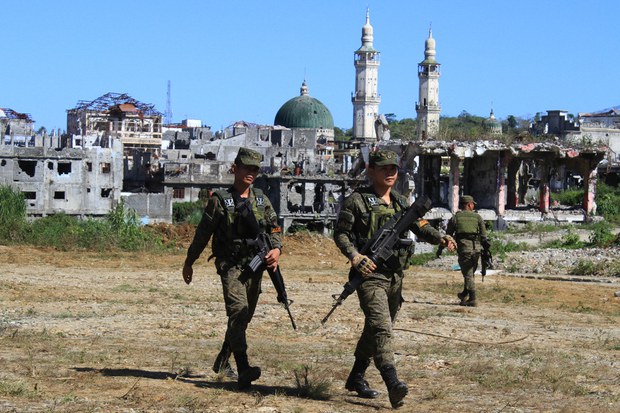IS-Linked Philippine Militants Get Life Sentences for 2016 Bomb Attack
2020.09.29
Davao and Cotabato, Philippines
 Government troops secure an area in the southern Philippines city of Marawi that remains off limits to civilians, Feb. 21, 2020.
Government troops secure an area in the southern Philippines city of Marawi that remains off limits to civilians, Feb. 21, 2020.
A Philippine court has convicted and handed life sentences to 10 Filipino militants linked with Islamic State for their roles in a 2016 bomb attack that killed 15 people at a night market in Davao, President Rodrigo Duterte’s southern hometown.
Judge Marivic Vitor of the Regional Trial Court in Taguig, Metro Manila, ruled that the defendants should serve their sentences on murder-related charges without the possibility of parole. Those convicted were members of the pro-Islamic State (IS) Maute group, whose leaders and others launched a siege on the southern city of Marawi in May 2017.
Sebastian Duterte, the acting mayor of Davao and the president’s son, praised part of the judge’s decision, which Vitor handed down on Monday.
“[The verdict] underscores the delivery of justice for the fatalities of the bomb attack, the survivors, their loved ones, the entire City of Davao and all the Dabawenyos who endured the impact of the said terror attack,” the mayor said in a statement posted on the city’s website.
In addition to the sentence, the judge ordered the seven defendants who were in court – T.J. Tagabaya Macabalang, Wendel Apostol Facturan, Musali Urbano Mustapha, Jessy Vincent Guinto Original, Zack Haron Lopez, Jackson Usi, and Ausa Abdullah Mamasapano – to compensate the victims’ families. Three fugitives who were convicted were not identified by the court.
The 10 were identified as members of the Maute band of militants under the command of brothers Omarkhayyam and Abdullah Maute. The brothers were among the estimated 1,200 fighters, soldiers and civilians killed during the five-month siege of Marawi.
Nearly three years after government forces broke the militants’ siege, some Marawi residents have been allowed to return to the ruined city, although an estimated 125,000 people remain displaced in evacuation camps.
In a speech to the nation late Monday, Duterte announced that Marawi and surrounding Lanao del Sur province would be put under a mild COVID-19 lockdown at the beginning of October, the Associated Press reported. The lockdown would restrict most residents to remain at home except for medical emergencies, to purchase food or make other essential trips.
Not guilty on terrorism charges
Terrorism charges under the Human Security Act of 2007 were dropped because the judge ruled that the prosecution had failed “to prove the perpetrators’ guilt by establishing that the accused were motivated by the desire to coerce the government to give in to an unlawful demand.
“The prosecution failed to prove with clear and convincing evidence that the bombing was performed because the president is from Davao City and that it was done to compel the government to reduce the military forces in Basilan who, at that time, were fighting the Abu Sayyaf Group,” the judge said, referring to another militant group based in the southern Philippines.
Sebastian Duterte said the fight for justice was far from over.
“And given the many lives lost because of the bomb attack – and given its impact on Davao City and its people – we respectfully express our dismay as we point out that this positive development is somehow tarnished by the absence of a strong law against terrorism,” he said in the statement.
“Although the perpetrators were convicted as murderers, they would have been convicted as terrorists as well – if only the Philippines had a good anti-terror law,” he said. “Four years after the grisly attack, we continue to mourn with the families of the victims and the survivors.”
In addition to killing 15 people, the Sept. 2, 2016, bombing injured 70 others. President Duterte, who had taken office two months earlier, was in Davao at the time but not near the blast site.
In July 2020, the president signed the Anti-Terrorism Act, which repealed the Human Security Act of 2007. The act, which has drawn protests, empowered law enforcers to arrest suspected terrorists without warrants and detain them without charges for up to 24 days.
One month later, a pair of suicide bombing attacks in Jolo left 15 dead. The suicide bombers were believed to be working with an IS branch led by Mundi Sawadjaan, a relative of IS-Philippine chief Hatib Hajan Sawadjaan.
The military has alleged that Hatib Hajan Sawadjaan was the mastermind of a twin suicide bombing at a church in Jolo that left at least 23 dead.
Richel V. Umel in Iligan City, Philippines, contributed to this report.







